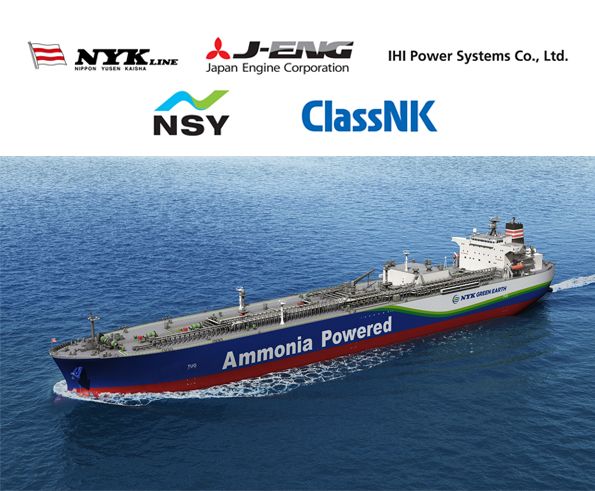Engine room safety accreditation granted for NYK’s ammonia-powered gas carrier
By Julian Atchison on August 26, 2024

Click to learn more. Safety accreditation for the engine room onboard NYK’s ammonia-fueled medium gas carrier has been granted by ClassNK, with the vessel due for delivery in Nov 2026. Source: NYK Line.
ClassNK has granted a “world-first” accreditation for an ammonia-fueled, medium gas carrier design currently being constructed by NYK, IHI, Japan Engine Corporation and Nihon Shipyard. The “Machinery Room Safety for Ammonia (MRS)” class notation indicates that the design includes “excellent ammonia safety measures” in the engine room, and that the vessel meets the “highest safety measures” under current class guidelines for ammonia-fueled ships. To achieve the MRS accreditation, personnel exposure to any accidental ammonia leaks in the engine room must be minimised. The vessel consortium undertook a thorough risk assessment from the crew’s perspective, which was reviewed and approved by ClassNK.
The medium gas carrier is due for delivery in November 2026. The vessel is being developed with funding from Japan’s New Energy and Industrial Technology Development Organization (NEDO), and a contract has already been signed with Japan Marine United to build the 40,000 m³ vessel in Ariake. The vessel’s main engine will be an ammonia fuel dual-fuel, two-stroke engine built domestically by Japan Engine Corporation. An auxiliary four-stroke engine will also feature on the vessel: this will be an ammonia dual-fuel design developed by IHI Power Systems, who announced successful ammonia combustion tests had taken place in May 2023. This four-stroke design will also feature aboard the A-Tug vessel, which is now complete and will enter three months of commercial trials in Yokohama harbor.
Maritime transport of ammonia: India to Japan
With its ammonia-fueled carrier approaching operations, NYK has committed to play a critical role in a new renewable ammonia supply chain. Sojitz and Kyushu Electric have committed to offtake the full volume of ammonia production from the first phase of Sembcorp’s under-development project in India. Beginning in the latter half of this decade, 200,000 tons per year of renewable ammonia will be produced, and NYK will transport the full volume to the Kyushu region in Japan. In Kyushu, the ammonia will be distributed to industrial and power generation customers.